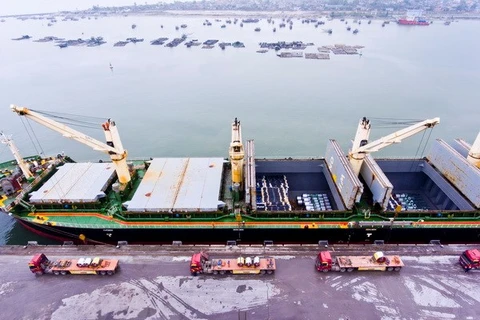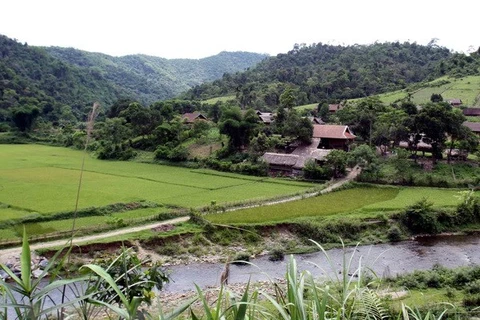 Steam drying kilns full of anchovies in Phu Loi craft village in Hoang Mai district are polluting the environment. (Photo: danviet.v)
Steam drying kilns full of anchovies in Phu Loi craft village in Hoang Mai district are polluting the environment. (Photo: danviet.v) Nghe An (VNS/VNA) - Environmental pollution in some craft villages, especially food processing villages in the central province of Nghe An, has gotten worse. It not only affects the local communities but also raises concerns over food safety.
For many years, steam drying kilns full of anchovies in Phu Loi craft village in Hoang Mai district have caused pollution, with untreated waste discharged directly into nearby Mai Giang River.
“Recently, there are many more steam kilns drying anchovies, with the strong stench getting worse. Many surrounding households have to close their doors, while the Mai Giang River becomes dirty with discharged water,” Phu Loi villager Tran Van Hau said.
Another resident of Quynh Di commune Tran Thi Van complained about the smell of fish on the side of provincial road 537B.
“There are sometimes dozens of tonnes of fish piled here, attracting a lot of flies,” Van said.
Quynh Di commune authorities have repeatedly coordinated to examine and prompt local businesses to solve the issue but they have not complied with the environmental sanitation process.
In Huynh Duong village in Dien Chau district, nearly 300 households specialise in making vermicelli noodles. They produce about 10 tonnes of vermicelli every day, creating jobs for hundreds of local workers. Every day thousands of litres of untreated wastewater is discharged straight into the fields, causing a bad smell in hot weather.
Many people in the village said although they closed their doors, the unbearable stench still creeps into the house. In recent years, the environmental pollution in Huynh Duong village has impacted agricultural production, meaning many paddy areas are unable to grow rice.
Some residents of Huynh Duong village and neighbouring villages repeatedly petitioned local authorities but are still without a solution.
Phan Huy Ngan, Chairman of the Dien Quang Commune People's Committee, said it was hard to ask local people to spend tens of millions of dong to treat sewage.
“The local authorities can encourage people to cover drainage ditches to reduce the smell, but there is no better solution," he said.
According to Dinh Sy Khanh Vinh, Deputy Director of the Nghe An Environmental Protection Sub-department, the pollution from craft villages is alarming, especially those producing noodles, cake and seafood.
In Nghe An province, there are 153 craft villages, of which villages processing seafood in Quynh Di, Quynh Luu and Dien Ngoc are causing serious pollution.
“It’s very difficult to solve because there is no capital to buy machinery and equipment. The department has set up projects, but the capital is not available,” he said.
Thai Van Nong, Deputy Director of the provincial Department of Natural Resources and Environment, said that building and operating environmental protection facilities requires a lot of capital, while the local budget was limited.
“Calling for investment in the form of social mobilisation from private sources is not effective as businesses also have difficulties in capital,” he said.
“Departments should focus on guiding the application of advanced, environmentally-friendly technologies; apply cleaner production and technical solutions to handle the environmental issues for the craft villages to operate sustainably,” he added.-VNS/VNA
VNA






















